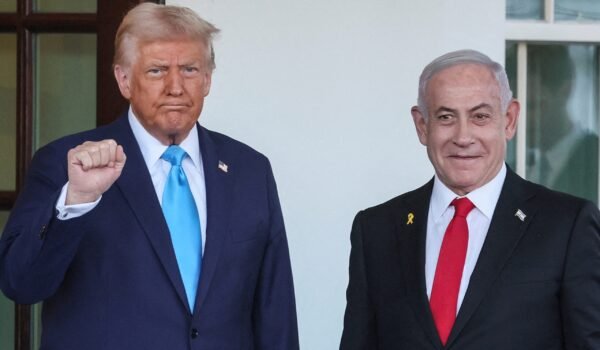Palestinians reject Trump’s Gaza plan; Arab states reject Trump’s Gaza takeover proposal

Palestinians and Arab states have rejected former U.S. President Donald Trump’s proposal for the U.S. to take over Gaza. Trump’s plan, which involves resettling Palestinians and developing Gaza, has been widely condemned as a violation of international law and an infringement of Palestinian rights.
Palestinian Response:
Palestinian leaders have firmly rejected Trump’s plan, emphasizing that Gaza is an integral part of the State of Palestine.
They assert that forced relocation would be a grave violation of international law.
Palestinians have expressed their determination to remain in Gaza and rebuild, despite the extensive damage.
Palestinian officials have dismissed Trump’s suggestion outright, emphasizing that Gaza’s residents would not abandon their homeland.
Arab States’ Response:
Saudi Arabia has firmly rejected Trump’s plan, asserting that it will not establish diplomatic relations with Israel without the creation of an independent Palestinian state.
The Saudi Ministry of Foreign Affairs has declared that the establishment of a Palestinian state is a steadfast and resolute stance.
Other Arab nations have also opposed the proposal, warning that any forced expulsion of Gazans would violate international law and fuel further instability.
Egypt has highlighted the necessity for reconstruction without displacing the Palestinians.
Jordan has rejected any efforts to annex Palestinian territories.
Turkey has described the notion of relocating Palestinians from Gaza as unacceptable.
China has also rebuffed Trump’s plans, saying it opposes forced displacement of Palestinians. The international consensus largely favors a two-state solution that allows Palestinians self-determination, and the U.S. proposal to take over Gaza was seen as a violation of that principle.
Several entities have rejected President Donald Trump’s proposal for the United States to take control of Gaza and relocate Palestinians, including Palestinian leadership, Arab states, and international organizations. The plan has been widely criticized as impractical and a violation of international law.
Palestinian Authority: President Mahmoud Abbas stated that the rights of Palestinians will not be compromised and that Gaza is an essential part of Palestine, rejecting any forced relocation as a grave infringement of international law. Hussein al-Sheikh of the Palestine Liberation Organization (PLO) also rejected any displacement of Palestinians.
Hamas: The organization has denounced Trump’s proposal as a “recipe for chaos,” asserting that Gazans will resist displacement attempts. They view the plan as an “expulsion from their land” that could ignite regional unrest.
Arab Nations: Arab states have dismissed the proposal, with Saudi Arabia reiterating that it will not establish diplomatic relations with Israel without the formation of a Palestinian state. Egypt has also emphasized the necessity for reconstruction without displacing Palestinians. A joint statement from Egypt, Jordan, Saudi Arabia, the United Arab Emirates, Qatar, the Palestinian Authority, and the Arab League rejected plans to move Palestinians out of Gaza and the West Bank, warning that such plans threaten regional stability and undermine peace prospects.
Saudi Arabia: The Saudi foreign ministry has “categorically rejected” Trump’s plan for post-war Gaza and has reiterated its commitment to establishing an independent Palestinian state, asserting that it would not normalize relations with Israel without that outcome.
International Community: Western allies of the United States and Israel also oppose the initiative.
Ethnic Cleansing: Some critics have characterized the plan as a form of ethnic cleansing. Senator Chris Van Hollen called it “ethnic cleansing by another name”.
International Law: Critics say that Trump’s proposal would contravene international law and undermine America’s claims to uphold a rules-based global order.
Regional Stability: Arab nations warned that the plan would threaten the region’s stability, risk expanding the conflict, and undermine prospects for peace.
Two-State Solution: The proposal would extinguish any remaining hopes for a viable two-state resolution, which has been a fundamental aspect of U.S. foreign policy since the early 1990s.
Palestinian Perspective: Palestinians have expressed fears of a repeat of the “Nakba,” when hundreds of thousands were displaced during the 1948 conflict.
Other Views: The Council on American-Islamic Relations (CAIR) has stated that Gaza belongs to the Palestinian people, not the United States, and described Trump’s call for Palestinian expulsion as unacceptable, warning that any forced removal of Palestinians would constitute a crime against humanity.
